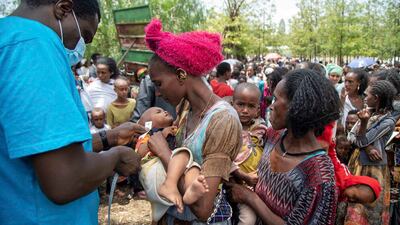The UN on Friday rejected Ethiopia's decision to expel seven high-ranking UN officials from the African country, saying the move by Addis Ababa did not follow the basic rules of global diplomacy.
UN spokesman Farhan Haq told reporters that Ethiopia’s classification of its staffers as “personae non grata” was typically used when kicking out foreign diplomats but did not apply to the world body’s employees.
Addis Ababa on Thursday accused the seven UN humanitarians of “meddling” in its affairs and gave them 72 hours to leave, even as its war-torn northern Tigray region was battling a famine.
The UN wrote to Ethiopian diplomats in New York “to clarify that it is the long‑standing legal position of the organisation not to accept the application of the doctrine of persona non grata with respect to United Nations officials,” Mr Haq said.
“This is a doctrine that applies to diplomatic agents accredited by one state to another state.”
UN Secretary General Antonio Guterres made the same point in a phone call on Friday with Ethiopian Prime Minister Abiy Ahmed, said Mr Haq. The seven UN officials remained in the country, he added.
Ethiopia's Ministry of Foreign Affairs on Friday accused the UN officials of diverting aid and communication gear to the rebel Tigray People's Liberation Front (TPLF), which has been at war with the government for nearly a year.
The expelled UN staffers also reportedly violated security arrangements, failed to demand the return of aid lorries deployed to Tigray and spread misinformation, the foreign ministry said.
The UN says there is no evidence its staffers meddled in Ethiopia’s affairs.
Western diplomats raised the issue at closed-door Security Council talks on Friday, but members did not agree to release any statement about the expelled humanitarians. Permanent council members Russia and China view the Ethiopian crisis as an internal affair.
Ireland's UN envoy Geraldine Byrne Nason said the expulsions may be a worrying “precursor to other activity”.
Estonian diplomat Andre Lipand condemned the expulsions, a copy of his comments to the 15-nation council that were sent to The National showed.
“These officials were doing difficult and important work helping Ethiopia and Ethiopian people in coping with the unfolding humanitarian disaster,” said Mr Lipand.
“We hope the government of Ethiopia will revise the decision.”
The US has condemned the expulsions and says it will slap sanctions on those who obstruct aid deliveries.
Mr Abiy in November sent troops into Tigray to topple the TPLF, the then-ruling party, accusing the group of staging attacks on army camps.
The Nobel Peace Prize winner declared victory within weeks after government forces took the Tigray capital Mekelle, but TPLF leaders remained on the run and fighting continued.
In June, however, pro-TPLF forces were able to retake the regional capital, leading Mr Abiy to declare a ceasefire and mostly pulling the army out of Tigray.
Tigrayan rebels have since pushed into Amhara and Afar.
Many regional and international powers worry that the spiralling conflict in Ethiopia — Africa’s second-most populous nation and a diplomatic heavyweight — could further destabilise an already fragile region.
About 5.2 million people in Tigray, or 90 per cent of the region’s population, are reliant on aid, the UN reported.
UN aid chief Martin Griffiths this week said that hundreds of thousands of people in Tigray were likely experiencing famine due to the government’s nearly three-month “de facto blockade” of the rebel-held region.
Ethiopian officials have accused aid workers of favouring and even arming Tigrayan forces, but have offered no evidence to support these claims. In August, the government suspended the operations of two major international aid groups and accused them of arming rebels.
The campaign group Human Rights Watch urged African and international powers to take a harder line against Ethiopia’s government.
“The expulsions reflect a broader trend of government hostility towards aid agencies and obstruction of humanitarian assistance in violation of international humanitarian law,” the group said in a statement.







